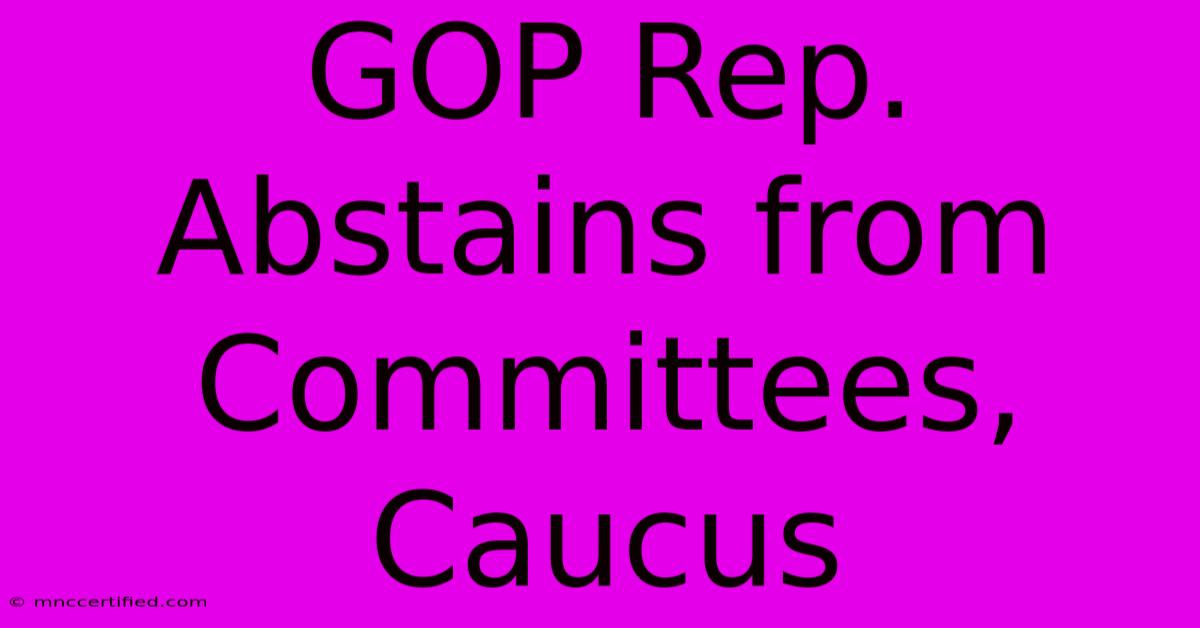GOP Rep. Abstains From Committees, Caucus

Table of Contents
GOP Rep. Abstains from Committees, Caucus: A Deep Dive into Representative [Representative's Name]'s Actions
The recent actions of Republican Representative [Representative's Name], who has abstained from committee assignments and caucus participation, have sparked significant debate and speculation within political circles. This article delves into the details surrounding Rep. [Representative's Name]'s decision, exploring the potential motivations, consequences, and implications for the Republican Party and the broader political landscape.
Understanding the Abstention: What Does it Mean?
Rep. [Representative's Name]'s abstention from committees and the caucus signifies a significant departure from the typical involvement expected of a sitting member of Congress. This isn't a simple absence; it represents a conscious and deliberate withdrawal from active participation in the legislative process within their own party. This action raises crucial questions:
- What are the underlying reasons for this abstention? Is it a strategic maneuver, a protest against party leadership, a reflection of internal disagreements, or a personal matter?
- What are the immediate consequences for Rep. [Representative's Name]? The loss of committee assignments can limit their influence on legislation and their access to valuable information. Exclusion from the caucus also restricts their ability to shape party strategy and participate in internal decision-making.
- What are the broader implications for the Republican Party? This abstention could signal deeper divisions within the party, potentially weakening its cohesion and effectiveness.
Potential Motivations Behind Rep. [Representative's Name]'s Decision
Several factors could be driving Rep. [Representative's Name]'s abstention. Speculation points towards:
- Disagreement with Party Leadership: A major point of contention could be policy disagreements with the party leadership on key issues such as [mention specific policy areas, e.g., economic policy, social issues, foreign policy]. This could lead to a deliberate effort to distance themselves from official party stances.
- Internal Party Conflicts: The abstention might be a response to internal power struggles or factionalism within the Republican party. Rep. [Representative's Name] may be aligning with a particular faction or expressing dissent against a dominant group.
- Personal Reasons: While less likely to be the sole explanation, personal circumstances, such as health concerns or family matters, could be contributing to their reduced participation.
- Strategic Calculation: Some speculate that this is a calculated political move. By abstaining, Rep. [Representative's Name] may be aiming to garner attention, negotiate a better position within the party, or even position themselves for a future political endeavor.
Consequences and Implications: A Ripple Effect
Rep. [Representative's Name]'s decision has several significant consequences:
- Weakened Legislative Influence: Without committee assignments, their ability to shape legislation is considerably reduced. They lose access to key legislative processes and the influence that comes with it.
- Erosion of Party Unity: This abstention contributes to the perception of internal division within the Republican Party, potentially impacting the party's image and effectiveness.
- Shift in Political Dynamics: Their actions will undoubtedly affect the balance of power within the House and the Republican caucus. It could embolden other dissenting voices within the party or lead to calls for greater party discipline.
- Public Perception and Media Attention: The abstention has garnered considerable media attention, influencing public perception of Rep. [Representative's Name] and the Republican Party as a whole.
Analyzing the Future: What's Next?
The long-term consequences of Rep. [Representative's Name]'s actions remain to be seen. Several scenarios are possible:
- Resolution and Return: Rep. [Representative's Name] may ultimately resolve their differences with the party leadership and resume active participation.
- Continued Abstention and Potential Consequences: Continued abstention could lead to further repercussions, including potential disciplinary actions from the party or a challenge to their seat.
- Shifting Political Alliances: The situation could lead to a realignment of political alliances within the Republican Party, with Rep. [Representative's Name] potentially forming new coalitions or influencing the party's direction from the outside.
This situation underscores the complexities and internal dynamics within the Republican Party. Further developments will be crucial in understanding the full impact of Rep. [Representative's Name]'s decision. The coming weeks and months will reveal whether this is a temporary disruption or a more significant shift in the political landscape. We will continue to monitor this evolving situation and provide updates as they become available.
Keywords: GOP, Republican, Representative [Representative's Name], Congress, Committee, Caucus, Abstention, Politics, Political Analysis, [Specific Policy Area Keywords], [Representative's State], Party Division, Legislative Process.

Thank you for visiting our website wich cover about GOP Rep. Abstains From Committees, Caucus. We hope the information provided has been useful to you. Feel free to contact us if you have any questions or need further assistance. See you next time and dont miss to bookmark.
Featured Posts
-
Psychological Terror Allegations Against Matilda Djerf
Dec 18, 2024
-
Pdc Darts Sherrock Wright Live
Dec 18, 2024
-
Ripples Rlusd Global Exchange Launch
Dec 18, 2024
-
Basketball Star Janis Timma Dies Anna Sedokova Mourns
Dec 18, 2024
-
Us Embassy Vanuatu Cyclone Damage Report
Dec 18, 2024